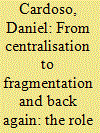| Srl | Item |
| 1 |
ID:
119260


|
|
|
|
|
| Publication |
2013.
|
| Summary/Abstract |
The first decade of the twenty-first century witnessed a sharp intensification of the relations between China and Brazil. The two countries deepened their commercial links and, as a result, Brazil became China's largest trading partner in Latin America. They have also further improved the quality of their political cooperation by setting up, for the first time, high-level bilateral institutions. Both countries have also been working together within multilateral institutions and mechanisms. The economic causes and impacts of this phenomenon have been widely discussed, but little however has been said about its specific political and strategic dimensions. In order to fill this gap, this article suggests an analysis that looks at the historical context of the relationship between China and Brazil, and sets up an enquiry into the most relevant domestic actors and at the strategic meanings behind their partnership. The goal here is twofold. Firstly, to analyse the role of domestic actors in the intensification of this partnership. Secondly, to discuss to what extent this intensification may be seen as evidence of any strategic interest of China and Brazil to put in place a more proactive, wilful and global foreign policy intended to shape globalisation and the world order.
|
|
|
|
|
|
|
|
|
|
|
|
|
|
|
|
| 2 |
ID:
167693


|
|
|
|
|
| Summary/Abstract |
Since the 1990s, Brazil’s foreign policy-making, traditionally a highly centralised and hierarchical process, has become more fragmented, plural and horizontal. In this context, the role of non-state actors has been increasingly relevant. The impact and significance of these actors have been however a matter of debate. While there are authors that consider that non-state actors play only a secondary role in the policy-making process, there are others that assert that these actors work alongside governmental actors and directly influence policy choices. Drawing on the concept of network governance, the paper proposes a different view from the two recurrent approaches in the literature mentioned above. It argues that the recent steps to transform Brazil’s state governance from hierarchy to horizontal networks have indeed expanded the room for the direct participation of non-state actors in the policy process. However, state authorities fought to adjust this tendency, in order to retain control over the decision-making process, by putting in place formal and informal coordinating mechanisms led by the Ministry of Foreign Relations and the Presidency. This suggests Brazil’s foreign policy was made in the shadow of hierarchy. The paper demonstrates the argument using the case of Brazil’s foreign policy towards China.
|
|
|
|
|
|
|
|
|
|
|
|
|
|
|
|